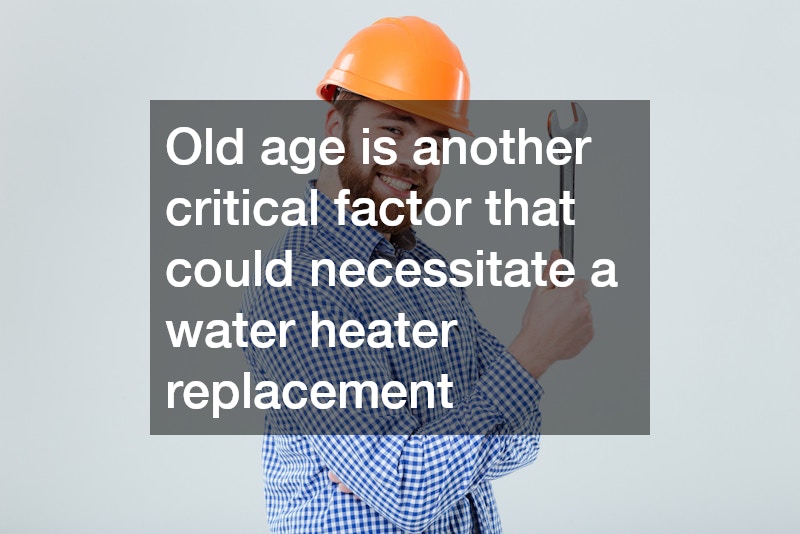The modern home relies heavily on hot water for a variety of purposes including cooking, cleaning, and personal hygiene. Therefore, a failing water heater can significantly disrupt daily routines. One of the earliest indicators of a failing water heater is inconsistent water temperature. Sporadic bursts of cold water amidst hot showers can be frustrating and hint at underlying issues. Rusty water emerging from faucets can also signify that the tank’s interior is corroding.
In addition to temperature fluctuations and rusty water, loud and unusual noises emanating from the water heater can be a significant warning sign. A build-up of sediment within the tank often leads to rumbling or banging sounds. These sediments can harden, causing diminished efficiency and eventual damage to the water heater. Regular maintenance can sometimes prevent this, but if the noises persist, it might be time to consider replacing the unit. Furthermore, visible leaks or pools of water around the base indicate serious problems that usually warrant a new installation.
Old age is another critical factor that could necessitate a water heater replacement. A traditional tank water heater has an average lifespan of 8-12 years, while tankless heaters last longer, usually 15-20 years. Regular inspections can help monitor the health of your water heater, preventing unexpected breakdowns. It’s beneficial to plan for replacement as your heater approaches the end of its lifespan. This proactive approach ensures continuous hot water supply, reducing the stress associated with sudden failures.
The Economic Impact of an Inefficient Water Heater
Operating an inefficient water heater can have noticeable impacts on your utility bills. As water heaters lose efficiency, they require more energy to heat the same amount of water. This translates into higher monthly expenses which, over time, add up to significant sums. Therefore, rising energy costs can often be traced back to an aging or malfunctioning water heater. In some cases, the cost of continued operation surpasses the investment in a new, energy-efficient model.
Upgrading to a newer water heater might necessitate an upfront investment, yet it pays off in the long run through energy savings. Modern water heaters often come equipped with energy-saving features that make them more economical to run. Features such as insulating tanks and timers are designed to minimize energy usage, while models powered by renewable energy sources contribute to reduced environmental impact. Considering water heater installation as an investment, rather than an expense, is a financially sound approach.
Alongside energy efficiency, newer water heater models often require less frequent maintenance. An efficient unit reduces the likelihood of needing emergency repairs, which typically come with high service costs. Over time, maintenance savings combined with reduced energy expenses justify the cost of a newer unit. Furthermore, many modern systems offer warranties that cover replacement parts, which can alleviate repair-related financial burdens. Thus, the decision to replace an inefficient water heater shouldn’t be postponed unnecessarily.
Choosing the Right Water Heater for Your Needs
Selecting the appropriate water heater involves evaluating various factors such as household size, water usage patterns, and fuel sources. For families with high water demand, a larger tank or a tankless system can be ideal. Tankless systems, although more expensive upfront, provide continuous hot water supply without the constraints of a limited tank capacity. Evaluating water consumption habits helps in selecting a system that meets current and future needs effectively. Expert guidance from a professional during water heater installation can be invaluable in making these decisions.
Another important consideration is the type of fuel source. While electric models are prevalent, gas-powered systems offer quicker heating times and can be more cost-effective in certain regions with high electricity rates. Solar-powered heaters are another environmentally friendly option, offering long-term energy savings at the cost of higher initial installation expenses. The choice often depends on the availability and price of the fuel source in your area. Assessing all options ensures the selected system aligns with both budgetary constraints and environmental considerations.
Lastly, consider the long-term benefits of choosing a high-efficiency model. Although these models might be priced higher than standard ones, the savings on utility bills provide a good return on investment. Additionally, such units often qualify for rebates and tax credits, further reducing the overall cost. Understanding efficiency ratings and choosing models with favorable ratings can significantly enhance your home’s energy efficiency. Taking the time to research and evaluate options leads to a water heater that delivers reliable and cost-effective hot water for years to come.
The Importance of Regular Maintenance
Regular maintenance plays a crucial role in extending the life and efficiency of a water heater. This involves routine tasks such as flushing the tank annually to remove sediment build-up. Sediment build-up can lead to overheated elements and reduced tank capacity, both of which compromise efficiency. Routine inspections also identify potential issues before they escalate into costly repairs or replacements. Such preventative measures enhance the longevity and performance of the water heater.
A neglected water heater often suffers from reduced efficiency and premature failures. By scheduling regular inspections and maintenance with a qualified technician, you ensure that the unit operates at its peak performance. During these checks, technicians can replace worn-out components, further delaying the need for a new installation. Maintaining a regular service schedule does not only prevent convenience disruptions but also protects against unexpected expenses. Consequently, consistent maintenance translates into extended equipment durability and reliability.
In conclusion, knowing when you need a new water heater involves understanding the signs of wear and tear and acknowledging time’s impact on efficiency. Acting promptly when signs of inefficiency or failure appear can prevent service disruptions and financial strain. Investing in a new water heater installation, suited to your needs, is an essential part of home management. Ultimately, regular upkeep not only extends the life of your current unit but also offers peace of mind regarding its ongoing reliability.




